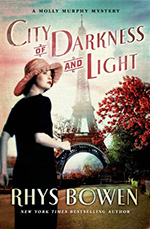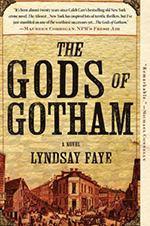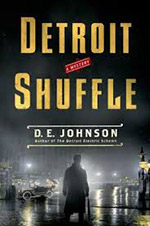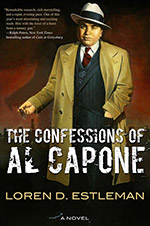Loren Estleman has written a lot of books, but many of them have been in one or another of his excellent series, so when he writes one that isn’t, it’s news. Actually The Confessions of Al Capone more resembles one of his westerns or Detroit novels than an Amos Walker effort because it’s a historical saga that uses a fictional character to portray a period of high lawlessness and great social change, seasoned with the presence of actual figures and events.
 The set up is typical masterful Estleman – a low level F.B.I functionary, Peter Vasco, is one day brusquely summoned to the highest level of power, J. Edgar Hoover himself. Peter assumes he’s going to be canned, but in fact he learns that Hoover has groomed him for a long cherished ambition, to once and for all learn the secrets of Al Capone. Scarface is greatly diminished in 1944, in exile in Florida, having been paroled from his tax evasion prison rap, riddled with syphilis and waiting to die. Hoover’s plan is masterful, if manipulative, and Peter is uniquely equipped to carry it out. He’s an almost priest, having left the seminary just short of graduation, and thus equipped to travel down to Miami, masquerade as a padre and hear the addled Al’s final confessions. His entree to the tightly controlled Capone household is his own father, once a driver for Capone in Chicago and now a fishing boat owner in Fort Lauderdale. Peter’s relationship with both his father and the church for which he’s to pose as a father is conflicted, so there’s a lot of soul searching involved with his pursuit of Capone, but he’s also glad, in these war years when Al’s racketeer colleagues have turned to black market profiteering, to be able to do something to help the war effort. read more
The set up is typical masterful Estleman – a low level F.B.I functionary, Peter Vasco, is one day brusquely summoned to the highest level of power, J. Edgar Hoover himself. Peter assumes he’s going to be canned, but in fact he learns that Hoover has groomed him for a long cherished ambition, to once and for all learn the secrets of Al Capone. Scarface is greatly diminished in 1944, in exile in Florida, having been paroled from his tax evasion prison rap, riddled with syphilis and waiting to die. Hoover’s plan is masterful, if manipulative, and Peter is uniquely equipped to carry it out. He’s an almost priest, having left the seminary just short of graduation, and thus equipped to travel down to Miami, masquerade as a padre and hear the addled Al’s final confessions. His entree to the tightly controlled Capone household is his own father, once a driver for Capone in Chicago and now a fishing boat owner in Fort Lauderdale. Peter’s relationship with both his father and the church for which he’s to pose as a father is conflicted, so there’s a lot of soul searching involved with his pursuit of Capone, but he’s also glad, in these war years when Al’s racketeer colleagues have turned to black market profiteering, to be able to do something to help the war effort. read more
 When Daniel stops by for a quick bite to eat, the sound of breaking glass is the last thing Molly knows before she realizes her house has blown up and is on fire. Baby Liam is still inside as is Molly’s maid – the baby makes it out fine. Daniel realizes he’s the target of the Cosa Nostra, and he thinks it’s a good idea to send Molly and baby Liam off to Paris to stay with Sid and Gus while he works things out at home. They’ve already begged her to visit.
When Daniel stops by for a quick bite to eat, the sound of breaking glass is the last thing Molly knows before she realizes her house has blown up and is on fire. Baby Liam is still inside as is Molly’s maid – the baby makes it out fine. Daniel realizes he’s the target of the Cosa Nostra, and he thinks it’s a good idea to send Molly and baby Liam off to Paris to stay with Sid and Gus while he works things out at home. They’ve already begged her to visit.

